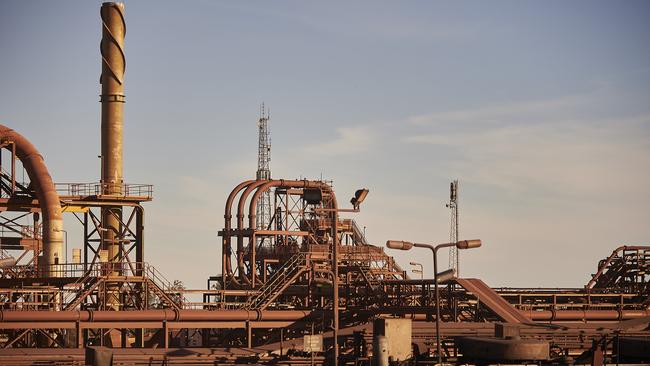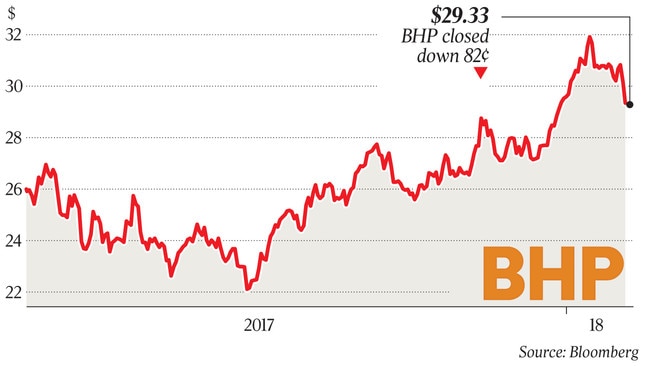Elliott Management pushes BHP to dissolve dual listing
Activist hedge fund Elliott has reignited its BHP Billiton restructure campaign after a six-month hiatus.

Activist hedge fund Elliott Management has reignited its BHP Billiton restructure campaign after a six-month hiatus, claiming dissolving the big miner’s dual-listed structure could provide $US22 billion ($28bn) of value.
Two weeks out from BHP’s first half-year earnings calls, New York-based Elliott has called on chairman Ken MacKenzie to open BHP’s books for an independent review of the Anglo-Australian dual-listed structure.
Elliott has a 5.5 per cent stake in BHP’s London-listed (plc) shares, which equates to a 2.2 per cent stake in the whole group.
Last year, it launched a campaign that galvanised shareholder discontent and led BHP to announce it would sell US shale oil and gas assets bought in 2011 for $US20bn.
The campaign also called for the dissolution of BHP’s dual-listed structure.
Originally the call was for a British-domiciled vehicle, but that was quickly changed to an Australian one when Scott Morrison said the former was not going to happen.
Yesterday, Elliott made its first official comments on BHP since August, when it applauded the appointment of Ken MacKenzie and moves to exit shale.
“Since your appointment as chairman, there has been a welcome increase in focus on shareholder value,” Elliott said in a letter to Mr MacKenzie, saying encouraging progress had been made in governance, capital allocation and transparency.
“The next, necessary step ... is for the board to commit to resolving, without further delay, the issue of BHP’s obsolete and value destroying DLC structure.”
Elliott called for BHP to commit, by the half-year report, to an independent review of the Anglo-Australian dual listing.
“To prevent any further value destruction resulting from the current inefficient structure, it is imperative that BHP properly address and move ahead with unification without delay,” the $US33bn fund said in its letter to Mr MacKenzie.
BHP declined to comment on the letter yesterday.
Elliott says unifying the shares would add $US22bn of value, or 18 per cent of BHP’s market capitalisation, for a cost $US391m.

This is less than the $US1.3bn to $US3bn BHP has said unification would cost.
The big miner has previously said it has thoroughly investigated dissolving the structure but that the costs outweigh the benefits.
Elliott’s cost estimates, in an “independent report” it commissioned from FTI Consulting, have been made without full access to information and using various assumptions.
While there does not seem any reason why BHP chief Andrew Mackenzie would not pursue a unification if it made economic sense, Elliott is calling for a review to put the issue to bed.
Elliott’s tilt to unify the structure needs to be viewed through the prism of the hedge fund’s BHP holding in plc shares.
Plc shares trade at a discount to Australian (Ltd) shares, meaning that even if unification did not deliver much value, Elliott’s stake value would be expected to increase as the value of the shares levelled out.
But it may be a fair question from Elliott as to why a review of the dual-listed structure at the request of a major shareholder shouldn’t be entertained, when a review of Minerals Council of Australia membership was conducted last year and made public after a resolution by the Australian Centre for Corporate Responsibility.
Elliott proposes dissolving the dual listing in favour of an Australian “top-hat” company with a primary ASX listing and premium London Stock Exchange listing that lets it retain its position in the FTSE100.
The FTI report claims unification would deliver a $US14.1bn increase in BHP’s market value, reflecting strategic, financial, organisational and structural improvements, and $US8.7bn of value unlocked from fully franked dividends and discounted off-market buybacks.
It forecasts Australian ownership of BHP would grow from 41 per cent now (21 per cent institutional and 20 per cent retail) to 60 per cent (30 per cent institutional and 30 per cent retail) because of the increased availability of franking credits that unifying the company would bring.
RBC analyst Tyler Broda said dissolving the dual listing would be a cleaner structure but questioned the $US22bn value claim.
“The majority of the $US22.4bn comes from a $US14.1bn uplift that is derived via comparable historical situations — there is a wide range of outcomes in the eight historical unwind situations chosen (0 to +32 per cent outperformance),” he said of FTI’s comparisons.
“We do not perceive BHP to be structurally undervalued — in fact, the opposite.”



To join the conversation, please log in. Don't have an account? Register
Join the conversation, you are commenting as Logout